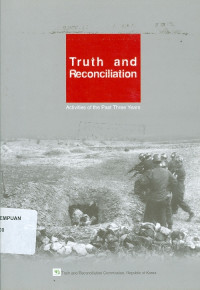
Text
Truth and reconciliation : activities of the past three years
In entering the third year of operation, the Truth and Reconciliation Commission, Republic of Korea (the Commission) is proud to present the "Activities of the Past Three Years" and is thankful for all of the continued support. The commission, launched in December 2005, has strived to reveal the truth behind massacres during the Korean War, human rights abuses during the authoritarian rule, the anti-Japanese independence movement, and the history of overseas Koreans. In entering the third year of operation, the Truth and Reconciliation Commission, Republic of Korea (the Commission) is proud to present the "Activities of the Past Three Years" and is thankful for all of the continued support. The Commission, launched in December 2005, has strived to reveal the truth behind massacres during the Korean War, human rights abuses during the authoritarian rule, the anti-Japanese independence movement, and the history of overseas Koreans. It is not an easy task to seek the truth in past cases where the facts have been hidden and distorted for decades. With the support of many determined to discover the truth however, we were able to achieve notable results. As of now, the Commission completed a total of 3,271 cases, including the successful truth verification of 1,813 cases among the 10,962 cases submitted to the Commission. This report explains the results of the past three years, as well as tasks for the future. The Commission is publishing this progress report to evaluate the activities thus far as well as to renew the commitment to our mission. The truth-finding activities of the Commission aims to acknowledge the neglected voices of the victims so that the government officially recognizes the uneasy truth, and society accepts it. The victims as well as the offenders may know the truth already. Although known by many, the truth is not being accepted by society. If public power has the duty to protect its people, but instead inflicts undue pain on innocent civilians, then the government must rightfully reconsider its wrongdoings and apply measures to redeem the victims by restoring their honor and by building trust between the people and the state. Past wrong-doings are now being rectified through decisions reached by the Commission. Through reexaminations, the court has exonerated those involved in five cases of human rights abuse, including the case involving the Jo Yong-Su of the Minjok Daily. Other cases that have received recommendations from the Commission are currently in the process of retrial. The Commission investigated fabricated espionage charges against fishermen abducted by North Korea. Due to the truth-finding results, the court reexamined the charges and finally declared the fishermen innocent. For forty years, the victims and offenders in the fishermen’s village remained divided, but as a result of the ruling, they were able to reconcile their differences and pursue a positive and peaceful coexistence. As a result of Commission findings, the truth behind massacres and behind victims abused by public power during the Korean War is in the process of being uncovered. Also being revealed are the number of victims and the identities of the offenders in the Bodo League massacres, the military and police suppression of rebels, and the U.S. military bombings
Availability
| KP.1.00101 | KP.1 INT t | My Library | Available |
Detail Information
- Series Title
-
-
- Call Number
-
KP.1 INT t
- Publisher
- Korea : Truth and Reconciliation Commision., 2009
- Collation
-
215p. ; 25 cm.
- Language
-
English
- ISBN/ISSN
-
-
- Classification
-
KP.1
- Content Type
-
-
- Media Type
-
-
- Carrier Type
-
-
- Edition
-
-
- Subject(s)
- Specific Detail Info
-
-
- Statement of Responsibility
-
-
Other version/related
No other version available
File Attachment
Comments
You must be logged in to post a comment
 Computer Science, Information & General Works
Computer Science, Information & General Works  Philosophy & Psychology
Philosophy & Psychology  Religion
Religion  Social Sciences
Social Sciences  Language
Language  Pure Science
Pure Science  Applied Sciences
Applied Sciences  Art & Recreation
Art & Recreation  Literature
Literature  History & Geography
History & Geography